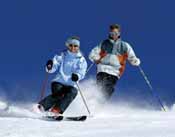Four more skiers suspended for high hemoglobin
The number of cross-country skiers suspended at the Turin Olympics grew to 12 Friday, with the athletes saying that their abnormally high hemoglobin levels were caused by dehydration and adjusting to high altitude not blood doping.

Four more skiers received five-day competition bans, joining eight who were suspended Thursday including two Americans and a former gold medalist from Germany. While some will miss the men's and women's pursuit event on Sunday, all will serve their suspensions in time to be cleared for possible competition.
There is no proof that the athletes did anything wrong: Hemoglobin, the red blood cells that increase endurance, can indeed be raised in innocent ways. And the skiing federation that conducted the tests noted that the bans were not disciplinary, but to "protect the health of the athlete."
Still, the test results raise the possibility of doping with synthetic hemoglobin or transfusions to increase the oxygen in the muscles.
"I am the last person to do something like this," said Germany's Evi Sachenbacher, who broke down in tears Friday while professing her innocence.
Athletes who fail blood tests are retested five days later. The eight suspended late Thursday are scheduled for new tests Monday; it was not immediately clear when the latest four failed their tests.
"We are confident that five days is a sufficient time to allow for the blood values to normalize if they are the result of living at a high altitude or dehydration," said Bengt Saltin, chairman of the FIS medical committee. "However, a five-day period is not sufficient to remove the impact of EPO (erythropoietin) or blood transfusion."
The two Americans suspended Thursday were Kikkan Randall and Leif Zimmermann. The other skiers suspended were Sean Crooks of Canada; Sergey Dolidovich of Belarus; Jean Marc Gaillard of France; Aleksandr Lasutkin of Belarus; and Natalia Matveeva of Russia.
On Friday, the International Ski Federation added four to that list: Alen Abramovic of Croatia; Russians Pavel Korosteljev and Nikolai Pankratov; and Robel Teklemariam of Ethiopia.
Neither American was favored to win a medal. But the U.S. team did lose a gold contender to drug testing Friday when Zach Lund, America's top skeleton slider, was banned from the Olympics for taking a common hair-restoration pill that can be used to mask steroids. A court conceded that he wasn't a cheat, but upheld his ban anyway.
Sachenbacher, who took gold and silver medals at the 2002 Salt Lake City games, explained to reporters that she normally drinks plenty of fluids when competing and training. She said she needs to drink more water in the coming days to lower her levels before being retested.
"At home, I drink a lot and I never did anything to be guilty," said Sachenbacher, who is ranked seventh in the overall World Cup standings.
International Olympic Committee president Jacques Rogge said the suspensions "were not doping tests."
Nobody seems too concerned about it, with various officials using the word "routine" to describe the action taken by the International Ski Federation. The cross-country venue is at about 5,013 feet (1,528 meters) in the Italian Alps.
The IOC plans to administer close to 1,200 drug tests during the Turin Olympics. The FIS sampled 224 athletes over two days this week, reports AP.
O.Ch.
Subscribe to Pravda.Ru Telegram channel, Facebook, RSS!





